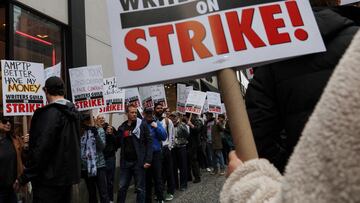The writers strike explained: What are they demanding and how can it affect TV shows and movies
WGA members have seen their pay fall by over twenty percent in the last decade. What are writers demanding, and how will the strike impact production?


On 1 May, coincidentally International Day of the Worker, the Writers Guild of America (WGA) announced their members would be going on strike. This is the first strike for the WGA in over a decade and was approved by ninety-seven percent of members who cast a ballot.
The WGA, representing around 11,000 members, negotiates with the Alliance of Motion Picture and Television Producers (AMPTP), an industry group made up of TV and movie studios including, Netflix, Amazon, Apple, Disney, Discovery-Warner, NBC Universal, Paramount, and Sony. Negotiations between WGA and AMPTP collapsed in recent weeks, with the studios remaining unwilling to include the demanded changes to the Minimum Basic Agreement (MBA) that govern the contracts offered to WGA members.
The rise of streaming and its impact on writers
You don’t need to be a writer in Hollywood to understand the fast and disruptive impact streaming has had on the TV and film industry. Shorter seasons, the decline of network television, and new players like Netflix, Hulu, and Amazon entering the scene may be favored by some viewers. For the writers, however, these changes have upended their livelihood and left them in an extremely vulnerable position. Now, WGA members are taking a stand and demanding a fair contract to improve conditions for those who make our favorite shows and movies possible.
Take the story of Alex O’Keefe, a young and talented writer who won an award for his work on “The Bear.” When interviewed by the BBC, he told Brandon Drenon that when it came time to attend the award show, he “didn’t have any money” and that, actually, the balance of his bank account was “negative.” In 2022, Disney Entertainment, the parent company of FX, the network where the show airs, made $28.19 billion in profits.
All you need to become a filmmaker is paper & pencil.
— Alex O’Keefe 🌻 (@AlexOKeefe1994) April 17, 2023
I put my imagination to the test, wrote my first screenplay, and landed the gig of a lifetime on @TheBearFX 🥫 pic.twitter.com/FGN78KJw2R
O’Keefe, his fellow members, and the WGA negotiating team have described the response from the studios as “wholly insufficient, given the existential crisis writers are facing.” As streaming services have taken off and begun to produce their own original content, WGA says that studios have weaponized the transition away from network and cable TV “to cut writer pay and separate writing from production, worsening working conditions for series writers at all levels.”
Writers demand better pay
Disney is not the only company raking in billions of dollars in profits. The union has pointed this fact out, noting that “while series budgets have soared over the past decade, median writer-producer pay has fallen.” When accounting for inflation, the median weekly pay for a writer has declined twenty-three percent.
Streaming services have been much more reluctant to offer writers a better contract than the Minimum Basic Agreement (MBA) that was agreed to by the WGA and AMPTP in 2020. The MBA is not intended to be a universal contract for all writers. Instead, it acts as a threshold to ensure contracts include a basic set of conditions. Over the last ten years, the number of writers offered an MBA contract has increased from thirty-three percent to just under half. And it’s not just the lower-level writing positions that have seen their pay and benefits falter in recent years. In 2013, only two percent of showrunners (top-level executive producers) were on an MBA contract; last year, that figure was twenty-four percent.
More protections for comedy and variety writers
A major component of the WGA demands relates to the precarious conditions many comedy and variety writers currently face when employed by streaming services.
Since 2015, streaming services, starting with Netflix, have been producing comedy-variety and talk shows. Currently, “several hundred writers” are employed by streaming giants, who “use the same formats, and draw from the same workforce,” as network shows of the same genre. However, Netflix, Amazon, Apple TV, and others “have refused [to offer] basic MBA protections” since they are not mandated to under the previous contract. The WGA has noted that the pay for these writers “are often lower than those paid to their peers.” The writers are demanding that MBA requirements be extended to these shows.
Interestingly, this demand would actually help to improve competition between networks and streaming services since, at this time, it is only the latter that is mandated to offer writers these protections for this type of show. Whether or not there are internal disagreements between the firms that make up the AMPTP have not been made public. As of 3 May, the AMPTP has not published any information discussing the perspective of the studios on the status of negotiations.
How will the strike impact the industry?
The first programs to be impacted by the strike were late-night shows like “The Daily Show,” “The Late Show with Stephen Colbert,” and “Late Night with Seth Meyers.” These shows have many writers on staff who are now on strike, making the production of the show impossible.
Does Stephen Colbert support the writers strike?
— More Perfect Union (@MorePerfectUS) May 2, 2023
Oh yeah. pic.twitter.com/Xt2gAWtp0u
Now with thousands of writers on the picket line, production has been halted on TV and movie sets. Without writers to rework scenes or people to draft scripts to pitch to actors, producers, or directors, Hollywood is slowing down. For viewers, this could mean delays in the release of new TV shows and movies.
Solidarity from those within the industry
Wilfred Chan writing for The Guardian, spoke with other workers in the industry, including hairdressers, makeup artists, and cinematographers, who, while nervous about what the strike could mean for their paycheck, have shown high levels of solidarity with the writers.
Speaking with Karen Westerfield, a leader from Local 706, the Make-Up Artists & Hair Stylists Guild, about the impact the strike has had on their members, their solidarity with the writers (and any union members fighting to improve workplace conditions) was affirmed. Many members are on daily contracts, which were described by Westerfield as ‘gig-economy-like’ conditions. This means that if production is halted during the strike, the studios are not required to pay members for work that they missed as a result of the labor action taken by the writers. The contract that they have negotiated with the studios forbids Local 706 members from striking to support the writers. This is a common stipulation among all guilds and unions in the industry. Westerfield said that the union told its members that they are more than able to strike in their personal capacity, should they so choose.
Local 600, otherwise known as the International Cinematographers Guild, has also expressed its support for the striking writers. On 2 May, the union affirmed their strong support for the WGA “in their fight for a fair contract.”
#WGAStrong #Solidarity #1u @WGAWest @WGAEast pic.twitter.com/rUbKoIwIR7
— IATSE Local 600 (@ICGLocal600) May 2, 2023
Many of these workers are also barred from striking in solidarity with the writers under their contracts as well. The same principle would apply to writers whose contracts do not allow them to strike if Local 600 members approved such action.
SAG-AFTRA could authorize a strike as early as July
Related stories
Members of the Screen Actors Guild-American Federation of Television and Radio Artists (SAG-AFTRA) also shown their solidarity with the WGA by joining writers on the picket line. SAG-AFTRA leadership has urged their members to join the writers on the picket line, which is allowed so long as they do so while they are “off the clock” and not during work time.”
Out here with members of @sagaftra at Warner Bros supporting @WGAWest 💪#sagaftramembers #1u #wga pic.twitter.com/gNWGQB5ZPS
— Jessica Gardner (@jessakeenie) May 3, 2023
SAG-AFTRA is slated to begin negotiations with the studios are their new contract on 7 June, and the union has said that they “will do everything in our power to reach an agreement” and that they “regard a strike as a last resort.” No strike can be approved before the current contract expires on 30 June 2023, but after that date, the members would be within their rights to authorize one. With such a threat pending, it may be a long summer for industry leaders... and for viewers at home, buckle up, it may be a while before WGA members are back in the writing room.

